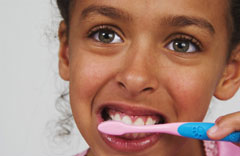

Proper dental care is an important part of a healthy lifestyle. Poor oral hygiene can lead to cavities and periodontal (gum) disease, which in turn can lead to a higher risk of heart disease and diabetes. Pregnant women with poor oral health can also experience an increased likelihood of delivering a pre-term, low birth weight baby. The risk of all of these occurrences can be reduced with good preventive care and diligent home habits.
Bacteria and the food that you eat — particularly sugars and starches — will form plaque on the teeth. The plaque, if left undisturbed, is a major contributor to gum disease or cavities. Cleaning the teeth thoroughly several times per day will help prevent the buildup of plaque.
A basic dental routine should include brushing for at least two minutes twice a day with fluoride toothpaste approved by the American Dental Association, and possibly rinsing with a fluoride or antibacterial rinse once or twice a day. Flossing at least once daily is also essential to remove food particles lodged between the teeth that brushing cannot reach. Some experts recommend flossing before brushing, but the main point is to do both.
A typical routine is to floss in the morning, brush for two minutes, then swish for 30 seconds with an antibacterial or fluoride rinse. Repeat the routine before bed. Ideally, you should brush and floss after every meal, but it is most important to set up a routine you can remember to do each day.
There are many types of toothbrushes on the market. Choose one with soft bristles. Toothbrushes with hard bristles can damage the teeth and gums and wear away the enamel at the gum line, causing gum recession. Any size and shape of toothbrush is fine as long as it feels comfortable in your mouth.
The American Dental Association recommends replacing toothbrushes every three to four months or sooner if the bristles become frayed. It is important to rinse your toothbrush with water thoroughly after brushing to remove remaining toothpaste and particles and to store it in an upright position to air dry.
Some people prefer power toothbrushes over manual toothbrushes. They are beneficial because they do the vibrating and brushing for you and you don’t have to be concerned about that part of the task. Most power brushes have timers, making it easier for people to brush the full two minutes, but they are by no means necessary. Your dentist can show you how to brush properly if you have any questions.
There are many types of floss as well. The bottom line is, as long as you floss, the type doesn’t matter, but some flosses can work better for some people. People with old fillings or tight contacts between their teeth may prefer a waxed or Teflon-covered floss to help them get in the tight space and prevent shredding. Some people prefer to use interdental cleaners — special wooden or plastic picks, sticks or brushes — to clean between teeth. Most people, however, need just regular floss.
Antibacterial mouthwashes can be an important adjunct to your oral care regimen. Some can have a medicinal taste, where others have a more refreshing taste. Although not as important as brushing or flossing, they can still be important tools in helping to keep the plaque in your mouth to a minimum.
Fluoride rinses can also be important, particularly if you are prone to getting cavities. Use of a fluoride mouth rinse in addition to fluoride toothpaste can give you additional cavity-fighting protection. It’s easiest to use the fluoride rinse before bedtime, because you are advised not to eat or drink for 30 minutes after you’ve swished.
It is advisable for most people to visit their dentist for a cleaning and an oral examination once every six months. Some people with excess plaque or people more prone to periodontal disease may need more than two visits each year. Your dentist can advise you how often you need to come in for cleaning or tell you if any additional periodontal treatment is necessary.
When it comes to oral care, it is best to remember that flossing is cheaper than a filling. And a filling is cheaper than a crown, and a crown is cheaper than an implant. The best thing you can do to prevent expensive dental procedures is start with a daily oral health care routine. Toothpaste, dental floss and a little diligence are more cost-effective than dental surgery. And with dental health so closely linked to your overall health, you have every reason to keep your mouth healthy.
For proper brushing techniques, click here

